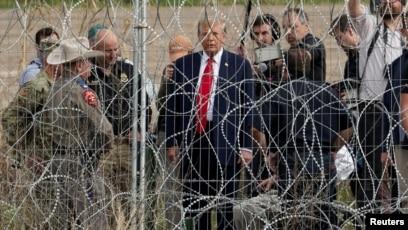In a move that has ignited fierce debate across the United States and beyond, former President Donald Trump has unveiled a sweeping plan to deport millions of illegal migrants to a select list of countries, a policy that critics are branding as a heartless purge. The proposal, shrouded in controversy, aims to address what Trump and his supporters describe as an unchecked crisis at the nation’s borders. Yet, opponents argue it is a brutal, dehumanizing campaign that prioritizes political posturing over compassion and reason. As the world watches, the plan’s implications ripple far beyond America’s borders, raising questions about morality, logistics, and global diplomacy.

The blueprint of Trump’s deportation strategy is as bold as it is polarizing. According to reports, the plan targets countries such as Guatemala, Honduras, El Salvador, and others in Central America and beyond, where the U.S. intends to send millions of undocumented migrants. The selection of these nations, often plagued by economic instability, violence, and poverty, has sparked outrage among human rights advocates. Many of these migrants fled those very conditions, seeking safety and opportunity in the U.S. Forcing them back, critics argue, is tantamount to sending them into harm’s way, with little regard for their safety or survival.
Proponents of the plan, however, see it as a necessary step to restore order and uphold immigration laws. Trump has long campaigned on a hardline stance against illegal immigration, framing it as a threat to national security and economic stability. His supporters argue that the U.S. cannot sustain the influx of undocumented migrants, pointing to strained public resources, job competition, and rising crime rates in certain areas. They view the deportation push as a fulfillment of campaign promises—a decisive action to prioritize American citizens and secure the nation’s borders.

Yet, the logistics of such a massive deportation effort are staggering. Experts estimate that deporting millions would require unprecedented coordination, funding, and infrastructure. The cost alone could run into the billions, straining federal budgets and diverting resources from other critical areas. Immigration and Customs Enforcement (ICE) would need to vastly expand its operations, from detention facilities to transportation networks. The plan also hinges on the cooperation of receiving countries, many of which lack the capacity or willingness to absorb large numbers of deportees. Diplomatic tensions are already simmering, with some nations signaling resistance to what they see as an imposition by the U.S.
The human toll of the policy cannot be overstated. Families could be torn apart, with children born in the U.S. facing separation from their undocumented parents. Stories of migrants who have built lives, businesses, and communities in the U.S. over decades are emerging, painting a picture of profound loss. Advocacy groups warn of the psychological and physical trauma that mass deportation would inflict, particularly on vulnerable populations like women, children, and those fleeing persecution. The image of families being forcibly removed from their homes has already become a rallying cry for protests across the country.
On the international stage, the plan risks damaging America’s reputation as a beacon of opportunity and compassion. Allies and adversaries alike are watching closely, with some questioning whether the U.S. is abandoning its moral leadership. Meanwhile, Trump’s supporters argue that the policy sends a clear message: the U.S. will no longer tolerate unchecked immigration. They see it as a reclaiming of sovereignty, a stance that resonates with a significant portion of the electorate.
As the debate rages, the nation stands at a crossroads. Is Trump’s deportation plan a heartless purge that betrays American values, or a bold move to restore law and order? The answer depends on where one stands on the fault lines of this deeply divisive issue. What is certain, however, is that the plan’s execution would reshape communities, economies, and lives in ways that will echo for generations. With emotions running high and stakes even higher, the world waits to see how this explosive chapter in America’s immigration saga will unfold.






